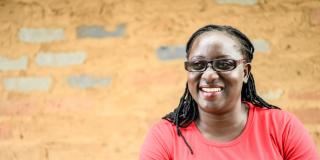
Volunteer Monica Atim has spent the past three years making sure that young people in some of the most remote and marginalised communities of Zambia have access to essential sexual and reproductive health information and services.
Around the world, young women and girls suffer from a severe lack of access to the basic information and resources that would protect their sexual reproductive health (SRH).
In Zambia, 29% of girls fall pregnant while in their teens, according to the country’s Gender Minister, Victoria Kalima. Child marriages are common too – the prevalence rate is 31%.
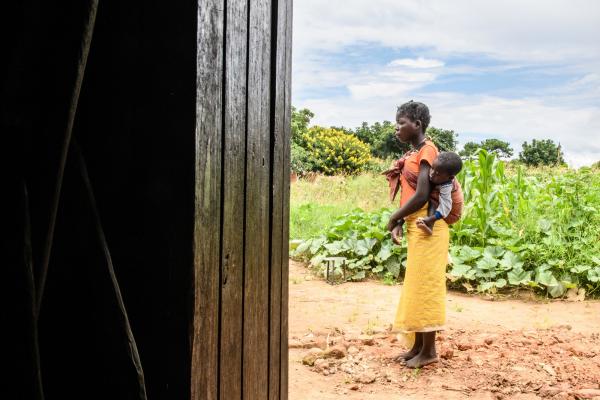
On the remote island of Mbabala in Luapula province’s Lake Bangweulu, with its lack of education, work and leisure opportunities, the average age of sexual debut for girls is just 13 years. For boys, it's 15.
VSO volunteer Monica Atim has been working in communities like this for almost three years on the Adolescent TALK! project, which is designed to share life-saving sexual reproductive health knowledge.
“In our African culture, families do not talk about sex or puberty. It's a taboo”, says Monica, who is Ugandan. “So there is nobody to tell these young people what is happening as their bodies are changing, what to do."
“That makes these young people very gullible to misinformation. For example, when a boy’s voice starts breaking and becomes deep, people may believe he has been to a witch doctor and that spirits are entering him. It might sound unusual, but if all you have is imagination these things become real.”
Overcoming barriers
It's vital to make young people knowledgeable about sexual reproductive health issues and aware of their rights, but it's in no way easy. Two of the biggest barriers are geography and culture.
To support young people, you first need to reach them. Zambia is a vast country – driving non-stop from the northern border with the Democratic Republic of Congo to the southern-most point at the mighty Victoria Falls would take 24 hours. Much of Zambia is remote, with almost 60% of people (about 10.5 million) living in rural areas.
By embedding volunteers like Monica into the most isolated and marginalised communities, we were able to bring information into areas that had never been reached before with information like this.
For Monica, that meant living and working in places like Mbabala Island, which she could only reach via an old ambulance boat loaned by the Ministry of Health: "The island is very, very remote. For the most part there's no power. At some points it's so sandy not even a motorbike can get across. Boat is the only option."
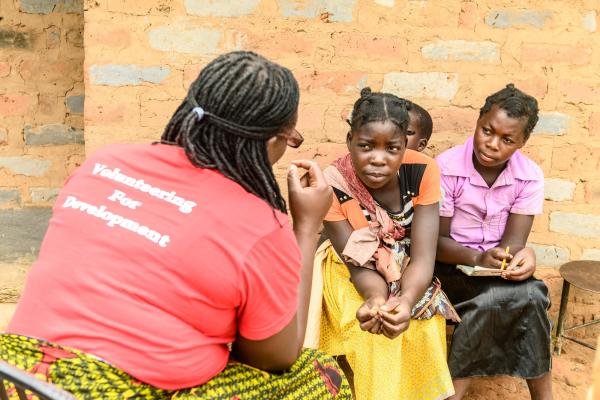
"It was about a 45 minute journey on the water - if the weather was good," says Monica. "Many times you set off, the weather is nice but all of a sudden you're in the middle of the lake, there is a lot of wind and it all goes haywire."
Leaving no one behind
Mbabala Island has a basic health centre with a single, overwhelmed nurse working to serve the medical needs of a population of 2,000, which rises up to 5,000 during fishing season.
Through Adolescent TALK!, we established a 'youth-friendly corner' at Mbabala Health Centre, providing confidential advice and counselling to young people on issues such as sexually transmitted infections (STIs), family planning and the dangers of teenage pregnancy. Condoms were provided, along with guidance on using and storing them safely.
"Access to sexual health commodities is a serious issue," says Monica. "At the start of the project, we did an outreach exercise, where we went into communities with two large boxes of condoms - we're talking 7,200 condoms per box. At the end there were none left, but people were still demanding more."
"At the beginning of the project, young people really lacked available information and services. Because of that lack, young people would reach out to traditional healers to treat an STI for example. That wasn't right. They were risking the disease getting worse and causing further complications - it could even cause infertility.
Opening the youth-friendly corner has boosted the number of people who are accessing sexual health services from the facility. The number of cases of STIs recorded at the clinic has also greatly reduced.
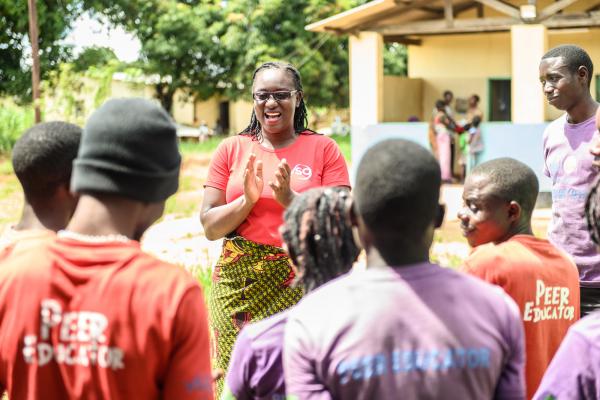
The power of peer educators
Even being embedded in communities, it was going to be a challenge to reach out to entire populations with sexual health issues, often for the first time.
Monica helped recruit 90 peer educators: young people trained to share information on these topics with their peers in schools and communities.
"It felt really nice working with them. Although, at the start they were sometimes difficult to work with! They would challenge me on the information I was sharing, because they were misinformed," says Monica.
"I didn't argue with them. I just said to myself, 'this is my catch, raw as they are. Let me do my best to help them get the right information that will help them better their lives’."
Reaching further
Monica has also supported the peer educators to produce and present radio programmes on local station Radio Bangweulu. Monica would write the scripts and arrange for the young presenters to be joined by experts to discuss a broad range of sexual health issues and hold radio phone-ins from listeners.
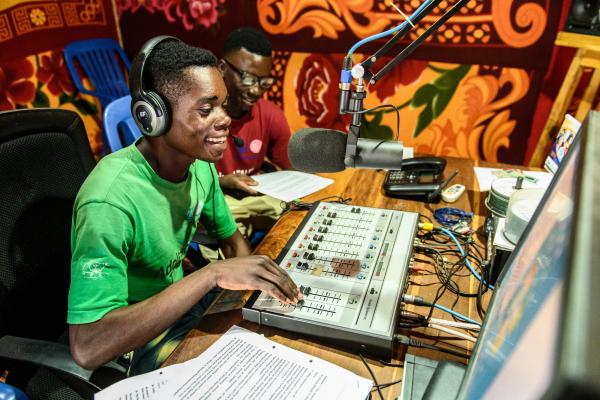
"In these rural communities, radio is the most popular medium, so it helped us spread information a lot further. We also formed 42 radio listening clubs, where young people could listen to the radio programmes together and discuss the content of the programme and raise any questions."
People-powered change
The project wasn't always plain sailing. After all, the topics being discussed are still taboo in many communities.
"In the beginning, they said ‘you’re going to teach our children about sex… you are encouraging promiscuity’," remembers Monica. "There was resistance."
"We were bringing in this project from a rights point of view. Zambia has policies that explain the rights of young people to access sexual health information and services. But at the community level, there is low awareness of policy. The project was not going to work unless the community understood what we were doing.
"It was very frustrating in the beginning but you have to sit down with them and consider it from their point of view. We had a meeting and we asked the elders, 'Are there girls who fall pregnant while they are still at school?' They said, 'Yes, a lot of them.'
"So then we asked, 'do young people get a lot of STIs?' They said, 'oh, yes they do'. Then we asked, 'so, has anyone been teaching them ways to avoid these things?'
"They finally saw we had a point and that's when they asked us to come and help! We had to get around it in a very innovative way, to show them they had a choice between continuing as they were, letting their children contract diseases and dying, or to work with us, because you can't stop them having sex but at least you can make sure they are safe."
Making an impact
To bring the community fully on-board, the project trained some of the same elders, traditional and religious leaders who'd initially resisted the project to become part of it. Some became 'change champions', to share information with parents of young people, who also lacked sexual health information, and 'community-based distributors', who shared contraceptives and condoms from their homes in a discrete and confidential way.
I feel proud. I feel like a champion.Monica Atim
"Being a part of this has been really great because we've worked at all levels. Working with the young people, working with the whole community. We wouldn't have made it without them all," says Monica.
"When you come into a community as a VSO volunteer, a lot is expected of you. It triggers you to go beyond what you know already, to research and consult with people. The project has had a big impact, and I have grown a lot as well”.
Find out more about our work in:
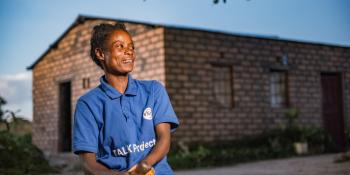
Zambia
We've worked in Zambia since 1958, building healthy communities and supporting people to develop sustainable and resilient livelihoods.
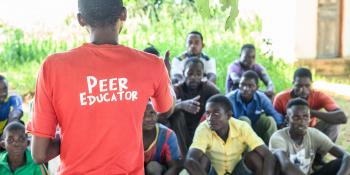
Tackling sexual health taboos
Improving young people's sexual and reproductive health and rights in rural Zambian communities.
